The Intel Optane Memory M10 (64GB) Review: Optane Caching Refreshed
by Billy Tallis on May 15, 2018 10:45 AM EST- Posted in
- SSDs
- Storage
- Intel
- PCIe SSD
- SSD Caching
- M.2
- NVMe
- Optane
- Optane Memory
AnandTech Storage Bench - Heavy
Our Heavy storage benchmark is proportionally more write-heavy than The Destroyer, but much shorter overall. The total writes in the Heavy test aren't enough to fill the drive, so performance never drops down to steady state. This test is far more representative of a power user's day to day usage, and is heavily influenced by the drive's peak performance. The Heavy workload test details can be found here. This test is run twice, once on a freshly erased drive and once after filling the drive with sequential writes.
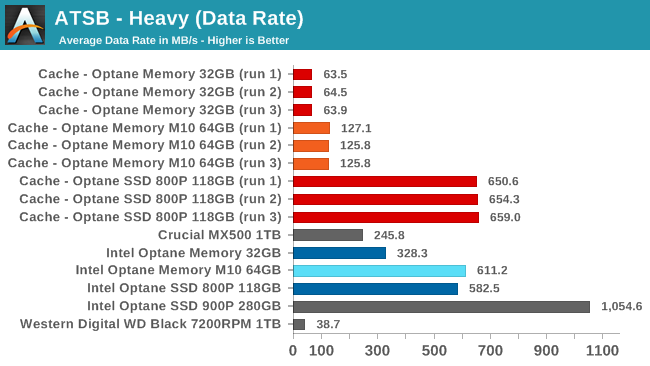
The 118GB Optane SSD 800P is the only cache module large enough to handle the entirety of the Heavy test, with a data rate that is comparable to running the test on the SSD as a standalone drive. The smaller Optane Memory drives do offer significant performance increases over the hard drive, but not enough to bring the average data rate up to the level of a good SATA SSD.
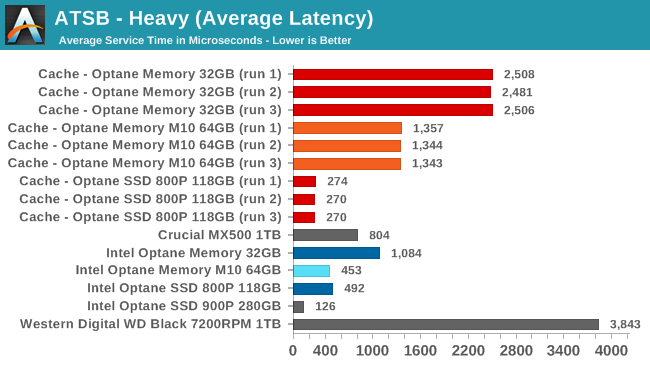
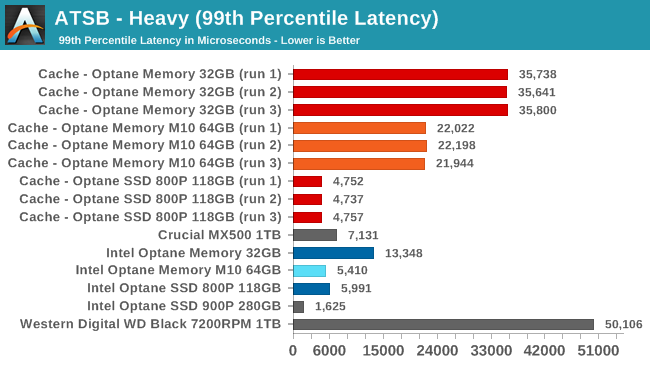
The 64GB Optane Memory M10 offers similar latency to the 118GB Optane SSD 800P when both are treated as standalone drives. In a caching setup the cache misses have a big impact on average latency and a bigger impact on 99th percentile latency, though even the 32GB cache still outperforms the bare hard drive on both metrics.
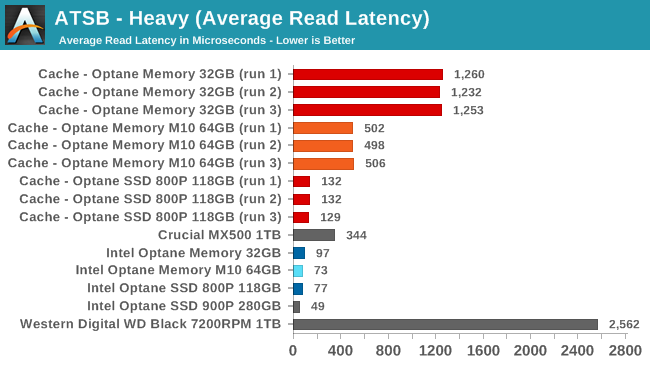
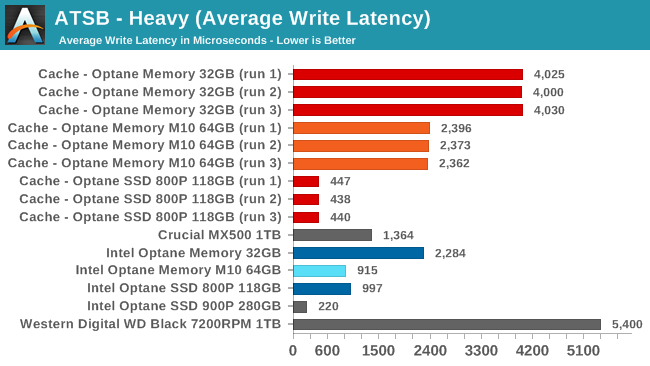
The average read latency scores show a huge disparity between standalone Optane SSDs and the hard drive. The 118GB cache performs almost as well as the standalone Optane drives while the 64GB cache averages a bit worse than the Crucial MX500 SATA SSD and the 32GB cache averages about half the latency of the bare hard drive.
On the write side, the Optane M.2 modules don't perform anywhere near as well as the Optane SSD 900P, and the 32GB module has worse average write latency than the Crucial MX500. In caching configurations, the 118GB Optane SSD 800P has about twice the average write latency of the 900P while the smaller cache configurations are worse off than the SATA SSD.
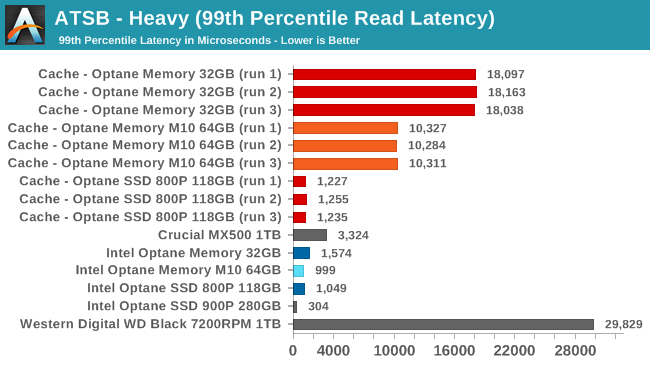
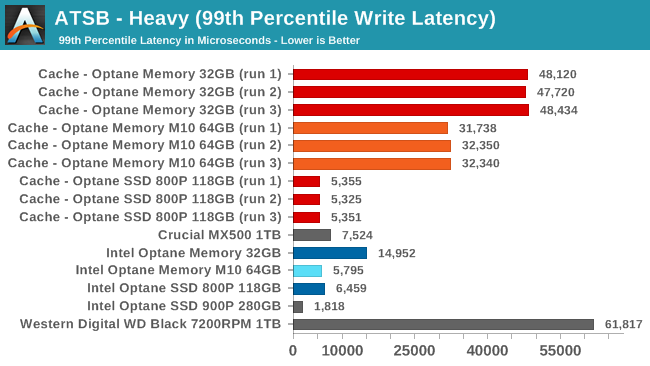
The 99th percentile read and write latency scores rank about the same as the average latencies, but the impact of an undersized cache is much larger here. With 99th percentile read and write latencies in the tens of milliseconds, the 32GB and 64GB caches won't save you from noticeable stuttering.










96 Comments
View All Comments
TrackSmart - Tuesday, May 15, 2018 - link
People seem to be talking around each other in these threads, without actually reading the substance of each person's reply.Dr. Swag didn't mention ONLY using a 500GB SSD. Just the opposite. He/she was suggesting that you could use a 500GB SSD for both a boot drive AND a 64GB cache drive. So you end up with ~440GB of normal SSD space (enough for most programs) AND a ~60GB cache drive to speed up your HDD accesses. All for the same price as adding a 64GB optane drive.
Addressing Dr. Swag's actual comment: I partially agree. One downside to the arrangement you suggested is that most affordable SSDs have lower write endurance than cache drives. They are also likely to be slower than an optane drive (but still fast compared to HDDs). And if your SSD boot/cache all-in-one drive dies, you might lose data on both the SSD and the HDD.
Regarding WithoutWeakness: Your comment makes sense if you are accessing the same subset of data over-and-over again. But if you are accessing a block of data ONCE to run an analysis and then moving onto a new block of data, then you will experience HDD speeds. Same goes for the first access to the data in cases where you will be using it multiple times. Slow the first time, faster in future times. So the downsides of a small cache will remain in a number of scenarios.
I personally think that Intel missed the boat with Optane. These solutions would have been a lot more convincing when SSD storage was a lot more expensive (i.e. 5+ years ago) and before other caching options existed for making use of 'normal' SSDs.
ಬುಲ್ವಿಂಕಲ್ ಜೆ ಮೂಸ್ - Tuesday, May 15, 2018 - link
Power loss protection ?From what I know so far, the MX500 (500GB) cache contains unique data that has not yet been written to normal nand and Crucial does not recommend using an SLC cache unless you have battery backup protection
An Optane cache drive is a "copy" of data already on the hard drive (or SSD) and I don't see a problem with power loss resulting in data loss once you clear the cache
SkipPpe - Friday, May 18, 2018 - link
Something like an Intel 3510 would be a better drive to use for this.ಬುಲ್ವಿಂಕಲ್ ಜೆ ಮೂಸ್ - Tuesday, May 15, 2018 - link
DOH......Nevermind!
sharath.naik - Tuesday, May 15, 2018 - link
I was wondering if the lifespan of these are no better than SSD. wont this burn out much faster than the drives lifespan if used as a cache for it?MajGenRelativity - Tuesday, May 15, 2018 - link
Optane drives are more durable than the average SSDCheapSushi - Wednesday, May 16, 2018 - link
Even more so than MLC NAND, which seems to be getting harder and harder to find (aside from Samsung's PRO line).Drumsticks - Tuesday, May 15, 2018 - link
Is anybody else interested in the performance of the 800p as a cache drive? The difference between an Optane SSD 800p and a 1TB HDD versus a 1TB SATA drive nowadays is less than $15, so it's pretty comparable for effectively the same capacity of storage. On the other hand, in the 25 or so graphs presented in this review, the 118GB caching solution outperforms a SATA drive, sometimes handily, in 24 of them. The 25th is power consumption, and one of them has a single loss in run 1 of the latency measurement for the heavy test.Hell, sometimes that solution outperforms the 900p. Why would you pick a comparably priced 1TB SATA SSD over something like that? If you need less storage, a 500GB will perform even worse than a 1TB, and a 250GB would be even worse still. Going down in capacity on the Optane drive would still probably keep you in the range of the SATA drive, while leaving you with double or quadruple the capacity.
Giroro - Tuesday, May 15, 2018 - link
"58GB 800P is functionally identical to the 64GB M10 and both have the exact same usable capacity of 58,977,157,120 bytes."Hold on, either something is wrong or that is straight-up false advertisement, a new low that is far beyond how storage manufacturers usually inflate their capacity specs. Don't just breeze past the part where Intel may be illegally marketing this thing. As far as I know Optane doesn't use over-provisioning, and it definitely isn't the normal GiB/GB conversion issue or the typical "formatting" excuse that doesn't actually apply to solid state media, so what gives?
It has to be a mistake, right?
The_Assimilator - Wednesday, May 16, 2018 - link
> it definitely isn't the normal GiB/GB conversion issueActually, it is.